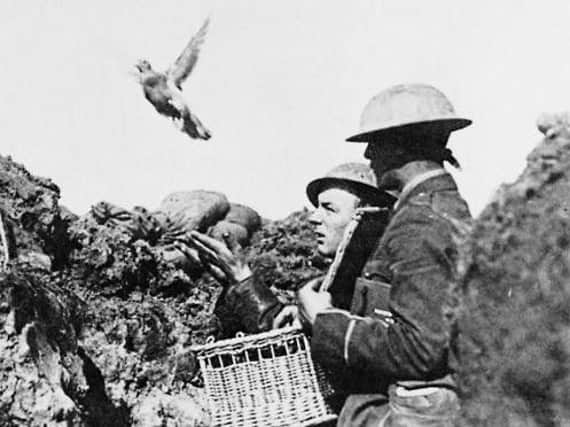Lancashire pigeons sent to war


Whether it was joining the armed forces, serving in the hospitals, donating money or making items of clothing to send to the troops, it seemed that everybody was able to turn a skill or ability into something useful.Many of the men who joined the Army, for example, took up trades pursuant to their pre-war occupation.For instance, miners served in the Tunneling Corps of the Royal Engineers, farriers served with the Royal Horse Artillery and those with a mechanical background would choose the Army Service Corps.However, one of the most unusual contributions during the First World War was the volunteering of a group of Chorley Pigeon Fanciers.On August 21, 1915, it was reported in the Chorley Guardian that: “In response to a circular issued by the North West Centre of the National Homing Union, 60 pigeon fanciers have been enlisted in the Royal Engineers to conduct a pigeon service for the Expeditionary Force.“The men, who will not have to undergo any military training, will act as loft managers and convoyers.“Four Chorley fanciers have been selected, viz, Messrs. EE. Jackson (Wheelton), J. Greenhalgh, R. Bond, and Whittle. They left Chorley on Monday to take up their duties.”One of those men, Ernest Edward Jackson, went on to lead quite a distinguished military career from such humble beginnings.Ernest was born in 1871, the son of physician and surgeon Edward and Margaret, and they lived at Rye Bank House, Wheelton.Prior to the war, he had worked in the textiles industry and had become a manufacturer of cotton.Ernest married Alice Heald of Chorley at St James’s Church, Chorley, on April 11, 1901, and they had two daughters, Mary and Isobel.Enlisting into the Carrier Pigeon Service at the age of 44 on August 14, 1915, Ernest received a Mention in Despatches for meritorious service in June 1916 by which time he had been promoted to Acting Sergeant, and in December 1916 he was awarded the Military Medal for “bravery in the field”.Sadly the details of the award are unknown but Ernest was clearly a fine soldier, not only because he had earned the MiD and MM in quick succession but he was also promoted from the ranks to Second Lieutenant, also in December 1916.No further military records have yet been found about Ernest but he did continue to earn promotion because a report exists to show that he only received his Military Medal by post, unusually, in August 1917, by which time he was a Captain and based at Chatham.From the pigeon loft of a local 44-year-old came a twice decorated officer of the Royal Engineers.